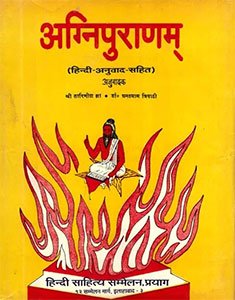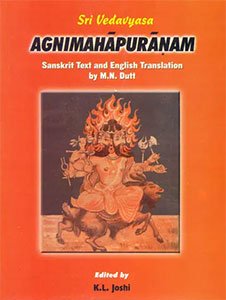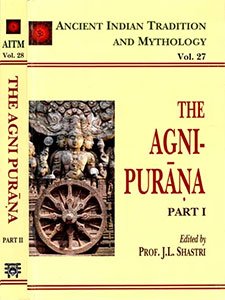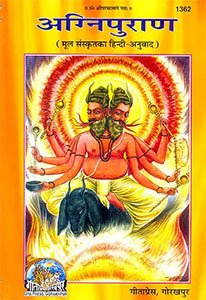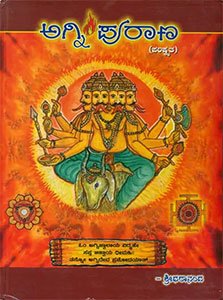Agni Purana [sanskrit]
97,288 words
This Sanskrit edition of the Agnipurana. It is one of the traditional eighteen Mahapuranas presented as an encyclopedia of ancient Indian history and knowledge. It contains either 382 or 383 chapters and over 10.000 verses (Sanskrit Shlokas).
Verse 79.30
ओं हां अग्नये स्वाहा। ओं हां सोमाय स्वाहा ।
ओं हां अग्नीषोमाभ्यां स्वाहा ।
ओं हां अग्नये स्विष्टकृते स्वाहा ।
गुरुं शिवमिवाभ्यर्च्य वस्त्रभूषादिविस्तरैः ।
समग्नं सफलं तस्य क्रियाकाण्डादि वार्षिकं ।
यस्य तुष्टो गुरुः सम्यगित्याह परमेश्वरः ।
इत्थं गुरोः समारोप्य हृदालम्बिपवित्रकं ॥ ३० ॥
oṃ hāṃ agnaye svāhā | oṃ hāṃ somāya svāhā |
oṃ hāṃ agnīṣomābhyāṃ svāhā |
oṃ hāṃ agnaye sviṣṭakṛte svāhā |
guruṃ śivamivābhyarcya vastrabhūṣādivistaraiḥ |
samagnaṃ saphalaṃ tasya kriyākāṇḍādi vārṣikaṃ |
yasya tuṣṭo guruḥ samyagityāha parameśvaraḥ |
itthaṃ guroḥ samāropya hṛdālambipavitrakaṃ || 30 ||
The Sanskrit text of Verse 79.30 is contained in the book The Agni Puranam (Anandashram Edition) by Shri Chimna Apate (श्री चिमणा आपटे). This book is available online or you could buy the latest edition:
Read online Buy now! The Sanskrit text by Shri Chimna Apate (श्री चिमणा आपटे) (1987)
Glossary of Sanskrit terms
Note: This extracts Sanskrit terms and links to English definitions from the glossary, based on an experimental segmentation of verse (79.30). Some terms could be superfluous while some might not be mentioned. Click on the word to show English definitions.
Agni, Soma, Svaha, Agnishoma, Svishtakrit, Svishtakrita, Guru, Shivam, Shiva, Iva, Abhyarcya, Vastri, Vastra, Abhusha, Divi, Tara, Sama, Saphala, Tad, Kriyakanda, Varshika, Yasya, Yah, Yat, Tushta, Samyak, Iti, Itya, Ahan, Parameshvara, Ittham, Ittha, Aropya, Hrid, Alambin, Pavitraka,
Analysis of Sanskrit grammar
Note: this is an experimental feature and only shows the first possible analysis of the Sanskrit text (Verse 79.30). If the system was successful in segmenting the sentence, you will see of which words it is made up of, generally consisting of Nouns, Pronouns, Verbs, Participles and Indeclinables. Click on the link to show all possible derivations of the word.
- Line 1: “oṃ hāṃ agnaye svāhā | oṃ hāṃ somāya svāhā ”
- Cannot analyse om*hā
- hām -
-
hā (noun, feminine)[accusative single]
- agnaye -
-
agni (noun, masculine)[dative single]
- svāhā* -
-
- Cannot analyse om*hā
- hām -
-
hā (noun, feminine)[accusative single]
- somāya -
-
soma (noun, masculine)[dative single]soma (noun, neuter)[dative single]
- svāhā -
-
svāhā (indeclinable)[indeclinable]svāhā (noun, feminine)[nominative single]
- Line 2: “oṃ hāṃ agnīṣomābhyāṃ svāhā ”
- Cannot analyse om*hā
- hām -
-
hā (noun, feminine)[accusative single]
- agnīṣomābhyām -
-
agnīṣomā (noun, masculine)[instrumental dual], [dative dual], [ablative dual]agnīṣoma (noun, masculine)[instrumental dual], [dative dual], [ablative dual]agnīṣoma (noun, neuter)[instrumental dual], [dative dual], [ablative dual]
- svāhā -
-
svāhā (indeclinable)[indeclinable]svāhā (noun, feminine)[nominative single]
- Line 3: “oṃ hāṃ agnaye sviṣṭakṛte svāhā ”
- Cannot analyse om*hā
- hām -
-
hā (noun, feminine)[accusative single]
- agnaye -
-
agni (noun, masculine)[dative single]
- sviṣṭakṛte -
-
sviṣṭakṛt (noun, masculine)[dative single]sviṣṭakṛt (noun, neuter)[dative single]sviṣṭakṛta (noun, masculine)[locative single]sviṣṭakṛta (noun, neuter)[nominative dual], [vocative dual], [accusative dual], [locative single]sviṣṭakṛtā (noun, feminine)[nominative dual], [vocative single], [vocative dual], [accusative dual]
- svāhā -
-
svāhā (indeclinable)[indeclinable]svāhā (noun, feminine)[nominative single]
- Line 4: “guruṃ śivamivābhyarcya vastrabhūṣādivistaraiḥ ”
- gurum -
-
guru (noun, masculine)[accusative single]
- śivam -
-
śivam (indeclinable)[indeclinable]śiva (noun, masculine)[adverb], [accusative single]śiva (noun, neuter)[adverb], [nominative single], [accusative single]śivā (noun, feminine)[adverb]
- ivā -
-
iva (indeclinable adverb)[indeclinable adverb]iva (indeclinable)[indeclinable]
- abhyarcya -
-
abhyarcya (noun, masculine)[compound], [vocative single]abhyarcya (noun, neuter)[compound], [vocative single]
- vastra -
-
vastṛ (noun, masculine)[compound], [adverb]vastṛ (noun, neuter)[compound], [adverb], [nominative single], [vocative single], [accusative single]vastra (noun, neuter)[compound], [vocative single]
- abhūṣā -
-
abhūṣā (noun, feminine)[nominative single]
- divis -
-
divi (noun, masculine)[nominative single]
- taraiḥ -
-
tara (noun, masculine)[instrumental plural]tara (noun, neuter)[instrumental plural]
- Line 5: “samagnaṃ saphalaṃ tasya kriyākāṇḍādi vārṣikaṃ ”
- sama -
-
sama (noun, masculine)[compound], [vocative single]sama (noun, neuter)[compound], [vocative single]√sam (verb class 1)[imperative active second single]
- gnam -
-
gnā (noun, feminine)[adverb]
- saphalam -
-
saphala (noun, masculine)[adverb], [accusative single]saphala (noun, neuter)[adverb], [nominative single], [accusative single]saphalā (noun, feminine)[adverb]
- tasya -
-
√tas -> tasya (absolutive)[absolutive from √tas]ta (noun, masculine)[genitive single]ta (noun, neuter)[genitive single]tad (noun, neuter)[genitive single]sa (noun, masculine)[genitive single]√tas (verb class 4)[imperative active second single]
- kriyākāṇḍā -
-
kriyākāṇḍa (noun, neuter)[compound], [vocative single]
- adi -
-
ad (noun, masculine)[locative single]ad (noun, neuter)[locative single]
- vārṣikam -
-
vārṣika (noun, masculine)[adverb], [accusative single]vārṣika (noun, neuter)[adverb], [nominative single], [accusative single]vārṣikā (noun, feminine)[adverb]
- Line 6: “yasya tuṣṭo guruḥ samyagityāha parameśvaraḥ ”
- yasya -
-
yasya (noun, masculine)[compound], [vocative single]yasya (noun, neuter)[compound], [vocative single]√yas -> yasya (absolutive)[absolutive from √yas]ya (noun, masculine)[genitive single]yaḥ (pronoun, masculine)[genitive single]yat (pronoun, neuter)[genitive single]√yas (verb class 4)[imperative active second single]
- tuṣṭo* -
-
tuṣṭa (noun, masculine)[nominative single]√tuṣ -> tuṣṭa (participle, masculine)[nominative single from √tuṣ class 4 verb]√tus -> tuṣṭa (participle, masculine)[nominative single from √tus class 1 verb]√tuś -> tuṣṭa (participle, masculine)[nominative single from √tuś class 1 verb]
- guruḥ -
-
guru (noun, masculine)[nominative single]
- samyag -
-
samyak (indeclinable)[indeclinable]
- ityā -
-
iti (indeclinable particle)[indeclinable particle]iti (noun, feminine)[compound], [adverb], [nominative dual], [vocative dual], [accusative dual], [instrumental single]itya (noun, masculine)[compound], [vocative single]itya (noun, neuter)[compound], [vocative single]√i -> itya (absolutive)[absolutive from √i]ityā (noun, feminine)[nominative single]√i -> itya (participle, masculine)[vocative single from √i class 2 verb]√i -> itya (participle, neuter)[vocative single from √i class 2 verb]√i -> ityā (participle, feminine)[nominative single from √i class 2 verb]
- āha -
-
āhan (noun, neuter)[compound], [adverb], [nominative single], [accusative single]√ah (verb class 5)[perfect active third single]
- parameśvaraḥ -
-
parameśvara (noun, masculine)[nominative single]
- Line 7: “itthaṃ guroḥ samāropya hṛdālambipavitrakaṃ ”
- ittham -
-
ittham (indeclinable)[indeclinable]ittha (noun, neuter)[adverb], [nominative single], [accusative single]
- guroḥ -
-
guru (noun, masculine)[ablative single], [genitive single]
- samā -
-
sama (noun, masculine)[compound], [vocative single]sama (noun, neuter)[compound], [vocative single]samā (noun, feminine)[nominative single]√sam (verb class 1)[imperative active second single]
- āropya -
-
āropya (noun, masculine)[compound], [vocative single]āropya (noun, neuter)[compound], [vocative single]
- hṛdā -
-
hṛd (noun, neuter)[instrumental single]
- alambi -
-
alambin (noun, masculine)[compound], [adverb]alambin (noun, neuter)[compound], [adverb], [nominative single], [accusative single]
- pavitrakam -
-
pavitraka (noun, masculine)[adverb], [accusative single]
Other editions:
Also see the following editions of the Sanskrit text or (alternative) English translations of the Verse 79.30
Agni Purana with Hindi Translation
by Tarinish Jha and Dr. Ghanshayam Tripathi (तारिणीश् झा और डॉ. घनश्याम त्रिपाठी) (2007)
Publisher: Hindi Sahitya Sammelan, Allahabad; 1199 pages; Title: अग्निपुराणम् (संस्कृत एवं हिन्दी अनुवाद);
Buy now!
Agni Purana (Two Volumes)
by M. N. Dutt (2023)
Publisher: Parimal Publication Pvt. Ltd.; Editor: K. L. Joshi.; ISBN-10: 8171101690; ISBN-13: 9788171101696; 1070 pages.
Buy now!
Agni-Purana (Set of 4 Volumes)
by N. Gangadharan (2006)
Publisher: Motilal Banarsidass Publishers Pvt. Ltd.; ISBN: Part I 8120803590 (9788120803596); Part II 8120803604 (9788120803602); Part III 8120801741 (9788120801745); Part IV 812080306X (9788120803060); 1271 pages.
Buy now!
The Agni Purana (Hindi)
by (2013)
Publisher: Gita Press, Gorakhpur; Title: अग्निपुराण (केवल हिन्दी अनुवाद); ISBN-10: 8129302934; ISBN-13: 9788129302939; 848 pages.
Buy now!
Agni Purana (Kannada)
by Sreedharananda (2013)
Publisher: Pooja Pusthaka Bhandara, Bangalore; Title: ಅಗ್ನಿ ಪುರಾಣ; 560 pages.
Buy now!Preview of verse 79.30 in Kannada sript:
ಓಂ ಹಾಂ ಅಗ್ನಯೇ ಸ್ವಾಹಾ । ಓಂ ಹಾಂ ಸೋಮಾಯ ಸ್ವಾಹಾ ।
ಓಂ ಹಾಂ ಅಗ್ನೀಷೋಮಾಭ್ಯಾಂ ಸ್ವಾಹಾ ।
ಓಂ ಹಾಂ ಅಗ್ನಯೇ ಸ್ವಿಷ್ಟಕೃತೇ ಸ್ವಾಹಾ ।
ಗುರುಂ ಶಿವಮಿವಾಭ್ಯರ್ಚ್ಯ ವಸ್ತ್ರಭೂಷಾದಿವಿಸ್ತರೈಃ ।
ಸಮಗ್ನಂ ಸಫಲಂ ತಸ್ಯ ಕ್ರಿಯಾಕಾಣ್ಡಾದಿ ವಾರ್ಷಿಕಂ ।
ಯಸ್ಯ ತುಷ್ಟೋ ಗುರುಃ ಸಮ್ಯಗಿತ್ಯಾಹ ಪರಮೇಶ್ವರಃ ।
ಇತ್ಥಂ ಗುರೋಃ ಸಮಾರೋಪ್ಯ ಹೃದಾಲಮ್ಬಿಪವಿತ್ರಕಂ ॥ ೩೦ ॥
![Agni Purana [sanskrit] - book cover](/uploads/a/Agni-Purana-Sanskrit.jpg)
